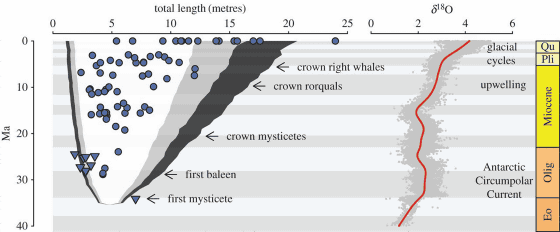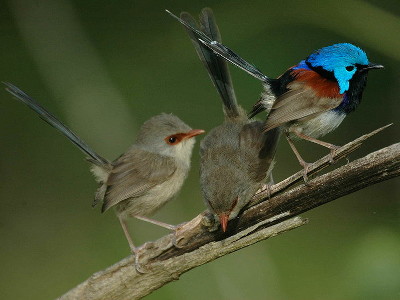Whales have grown quite lately quite recently, why is that?

The largest animal whale on the planet has grown up in the process of evolution but it turned out that its size increased sharply recently.
Evolution of mysticete gigantism | Proceedings of the Royal Society of London B: Biological Sciences
http://rspb.royalsocietypublishing.org/content/284/1855/20170546
Whales today are bigger than ever before. Now, we know why. | Popular Science
http://www.popsci.com/baleen-whales-big
Research teams such as Dr. Graham Slater of the University of Chicago studied the fossilis of 13 whale in the Smithsonian National Museum of Natural History, a total of 140 fossils of whales and fossils of 63 species extinct so that the change in the size of the whale I discovered that it occurred relatively recently, 4.5 million years ago. Since the fossils of the whale whale were abundant in each age, by examining fossils by age, we succeeded in tracing the evolution process of a whale.
According to research, whales and killer whales gradually expanded from the ground to the sea tens of millions of years ago, but the body of the whale quickly became enormous rapidly several times over 4.5 million years ago It turned out that it was. The size change of this body occurs not only in the whale whale but also in other species of whales, so it turned out that the cause of the enormous increase is likely to be external factor.

As a result of consideration of external factors, researchers found that the ice ages begin and the ocean current changes, the time when the ice sheet and glacier appears and the time when the whale become enormous, and this change of climate and change of ocean current I thought that it had a big influence on enlarging whales. Specifically, the sweet spot in which the water temperature is low and zooplankton occurs intensively due to the change in the ocean current is distributed all over the world, and the distribution of this whale's food has changed seasonally . As places where there are plentiful seasons appeared seasonally around the world, whales began to migrate around the world aiming for their sweet spot.

The total amount of plankton that appears in the world's ocean itself is not expected to change greatly, but places where plankton occurs abundantly due to changes in climate and ocean current can change dramatically, so plankton which is suddenly appeared abound It seems that it became advantageous to be huge to travel long distances to places. And whale whilst successfully reaching the sweet spot where the food is plentiful, it got even bigger by ingesting a large amount of nutrition.
·bonus
It is a whale whose body has grown enormously, but new research has revealed that the average body length has been shrinking in just a few decades as the number of individuals is rapidly reduced by commercial whaling in the 20th century.
Shrinking whales and what we can learn from the past | Nature Ecology & amp; Evolution Community
https://natureecoevocommunity.nature.com/users/50783-christopher-clements/posts/17908-shrinking-whales-and-what-we-can-learn-from-the-past
The research team of Dr. Christopher Clements et al. At the University of Zurich studied the whale's annual report prepared by the International Whaling Commission (IWC) from 1900. Since this report records not only the body length of whales but also the number of catches, we are investigating the relationship between changes in the number of whales and changes in body length.
The research team followed the change in body length and catch count, mainly in four species of nagara whale, blue whale, sperm whale, and sardine whale, and in the 70 years when commercial whaling was taking place, the body length decreased by about 4 meters It was understood that it was. As for the sperm whale, it turned out that the body length decreased continuously through the 20th century.

It is also pointed out that the decrease in the body length is related to the decrease in the number of individuals, and it seems that whales may have changed in size at a rapid pace as never before thanks to whaling activities by human beings.
Related Posts:







